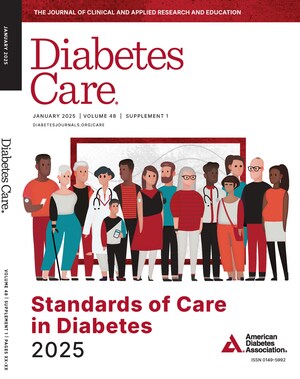NEW ORLEANS, June 13, 2016 /PRNewswire-USNewswire/ -- Distinguished grant recipients of the American Diabetes Association's "Pathway to Stop Diabetes" research initiative will present the latest progress in their respective research grants during the Association's 76th Scientific Sessions, June 10-14, 2016, at the Ernest N. Morial Convention Center in New Orleans.
With an innovative vision to provide researchers with the freedom, autonomy, and financial and professional resources to set them on the road to breakthrough discoveries, the Association's Pathway to Stop Diabetes initiative is designed to encourage and enable researchers to commit their careers to the field of diabetes. The program supports diabetes researchers with $1.625 million in research grants over the course of five to seven years. The goal of Pathway is to invest in individuals who wish to apply their expertise to diabetes research, particularly those who are just beginning their independent research careers, as well as outstanding scientists already established in other fields of research.
In addition to presentation in a Symposium on Monday, June 13, 8:00 a.m.-10:00 a.m. CT, a news briefing on Monday, June 13, 1:00 – 2:00 p.m. will feature four Pathway research grant recipients.
Grant recipient presentations in the News Briefing include:
- Stephen C.J. Parker, PhD, a researcher at the University of Michigan and 2014 grant recipient, will present information on his project, "Deconstructing Type 2 Diabetes Using Genome-wide High-density Multi-tissue 'Omics' Profiling." Parker's research focuses on the genetics of type 2 diabetes and ways in which common genetic variations can lead to a person being more susceptible to developing type 2 diabetes, as well as how those variations can affect the progression of the disease. Research has suggested that most type 2 diabetes-associated genetic variations reside outside genes, in regions generally referred to as 'regulatory elements.' These elements control when, where and how much a gene is turned on, and they are variable across tissues within each person. Parker is focused on identifying these hidden regulatory elements and linking them to the genes they control.
"This novel information could immediately suggest new drug targets and regions for quantitative disease surveillance over time, thereby helping to inform treatment strategies," said Parker. "Looking forward, I believe that these approaches will be closely tied to type 2 diabetes diagnosis, prognosis and treatment—and will, therefore, have a tremendous influence on medicine."
- Marie-France Hivert, MD, MMSc, a researcher at Harvard Pilgrim Health Care Institute and a 2015 Pathway grant recipient, will share her project, "Understanding Pathways of Fetal Metabolic Programming to Stop the Transgenerational Risk of Diabetes." Her research aims to understand how genes influence blood sugar regulation in pregnancy, and how maternal glucose in turn influences the regulation of genes in children during in utero development, and later in life. Hivert will highlight how her research is comparing ways in which certain genes influence glucose similarly or differently within pregnancy, in contrast to ways in which the genes influence glucose levels outside of pregnancy. Additionally, she will explain how diabetes in pregnancy can be different from one woman to another, as well as how the disease can potentially have different causes, including genetics, and how it can lead to different complications according to sub-types.
"If we can better define sub-types of diabetes in pregnancy, then we can target more intensive treatment in women who are at higher risk of complications during pregnancy," said Hivert. "And ultimately, we can more carefully follow women who are at higher risk of developing type 2 diabetes after pregnancy."
- Michael D. Dennis, PhD, a researcher at Penn State College of Medicine and a 2014 grant recipient, will present his project, "Hyperglycemia-induced Translational Control of Gene Expression in the Retina." Dennis' research focuses on diabetic retinopathy (disease of the retina), which is the most common neurovascular complication of diabetes and a leading cause of vision loss among working age Americans. While a number of studies have demonstrated that controlling high blood sugar reduces both the onset and progression of diabetic retinopathy, it is still unclear how elevated blood glucose levels impact the retina. Dennis' presentation will detail the idea that high glucose levels change which of our genes get made into proteins.
"We believe our research identifies an early molecular switch that determines the kinds of proteins that get created in the eye. Notably, when we make mice that lack a key piece of this molecular switch, they fail to develop the same vision loss as normal mice in response to diabetes. The buildup of a certain subset of proteins in the eye results in severe including vision loss, so it is crucial that we continue to investigate the root cause of retinopathy in people with diabetes," said Dennis.
- Thomas Delong, PhD, of the University of Colorado, Denver received a Pathway grant in 2015 for his project, "The Role of Hybrid Insulin Peptides in the Development of Type 1 Diabetes," which he will discuss in detail.
Delong will explain how in type 1 diabetes, the body's immune system attacks and destroys insulin-producing cells in the pancreas, and that an understanding of why the immune system attacks itself is an essential step in the fight against type 1 diabetes. In healthy people, T cells fight infections in the body by attacking foreign antigens (toxins, bacteria or other substances that induce an immune response). However, in type 1 diabetes, the immune system mistakenly attacks healthy cells. Delong will present research from his team that has identified a new form of modified antigen involved in type 1 diabetes. This modified antigen is formed in beta cells, which are cells that make and produce insulin, and is mistakenly classified by the immune system as foreign, or dangerous, leading to autoimmune attack. When this damage, or "attack" on beta cells occurs, the body's ability to produce sufficient insulin is affected, and type 1 diabetes results.
"We are working on the identifying the modified antigens affecting people with type 1 diabetes," said Delong. "We are also studying the mechanism that leads to the formation of modified antigens. The identification of disease-driving antigens in type 1 diabetes is critical for us to develop methods to prevent, stop or reverse disease onset."
Since the Pathway to Stop Diabetes' 2014 launch, 17 individual researchers have been awarded with a Pathway grant, offering these scientists substantial and flexible financial support and mentorship. The program is supported by contributions from individuals, foundations and corporations, including sponsors Sanofi, Novo Nordisk, Lilly Diabetes and AstraZeneca.
The American Diabetes Association's 76th Scientific Sessions, to be held June 10-14, 2016, at the Ernest N. Morial Convention Center in New Orleans, is the world's largest scientific meeting focused on diabetes. The 2016 Scientific Sessions is expected to attract more than 16,000 attendees, and offers researchers and health care professionals from around the world the opportunity to share ideas and learn about the significant advances in diabetes research, treatment and care. During the five-day meeting, attendees receive exclusive access to more than 2,500 original research presentations, participate in provocative and engaging exchanges with leading diabetes experts, and can earn Continuing Medical Education (CME) or Continuing Education (CE) credits for educational sessions. The program is grouped into eight theme areas: Acute and Chronic Complications; Behavioral Medicine, Clinical Nutrition, Education and Exercise; Clinical Diabetes/Therapeutics; Epidemiology/Genetics; Immunology/Transplantation; Insulin Action/Molecular Metabolism; Integrated Physiology/Obesity; and Islet Biology/Insulin Secretion. Margaret A. Powers, PhD, RD, CDE, President, Health Care & Education, will deliver her address on Saturday, June 11, and Desmond Schatz, MD, President, Medicine & Science, will present his address on Sunday, June 12. The top eight abstracts of this year's Scientific Sessions will be presented on Tuesday, June 14, in the Presidents Oral Session. In total, the 2016 Scientific Sessions includes 378 abstracts in 50 oral sessions, 2,021 poster presentations including 59 moderated poster discussions, and 335 published-only abstracts. Additional scientific research will be presented during 110 Symposia and 9 Professional Interest Group sessions. The 76th Scientific Sessions also includes presence from more than 130 corporate and organizational exhibitors in nearly 100,000 square feet of exhibit space. Join the Scientific Sessions conversation on Twitter, #2016ADA.
About the American Diabetes Association
The American Diabetes Association is leading the fight to Stop Diabetes® and its deadly consequences and fighting for those affected by diabetes. The Association funds research to prevent, cure and manage diabetes; delivers services to hundreds of communities; provides objective and credible information; and gives voice to those denied their rights because of diabetes. Founded in 1940, the Association's mission is to prevent and cure diabetes, and to improve the lives of all people affected by diabetes. For more information, please call the American Diabetes Association at 1-800-DIABETES (800-342-2383) or visit diabetes.org. Information from both of these sources is available in English and Spanish. Find us on Facebook (American Diabetes Association), Twitter (@AmDiabetesAssn) and Instagram (@AmDiabetesAssn).
Logo - http://photos.prnewswire.com/prnh/20141105/156803LOGO
SOURCE American Diabetes Association
Related Links
WANT YOUR COMPANY'S NEWS FEATURED ON PRNEWSWIRE.COM?
Newsrooms &
Influencers
Digital Media
Outlets
Journalists
Opted In






Share this article